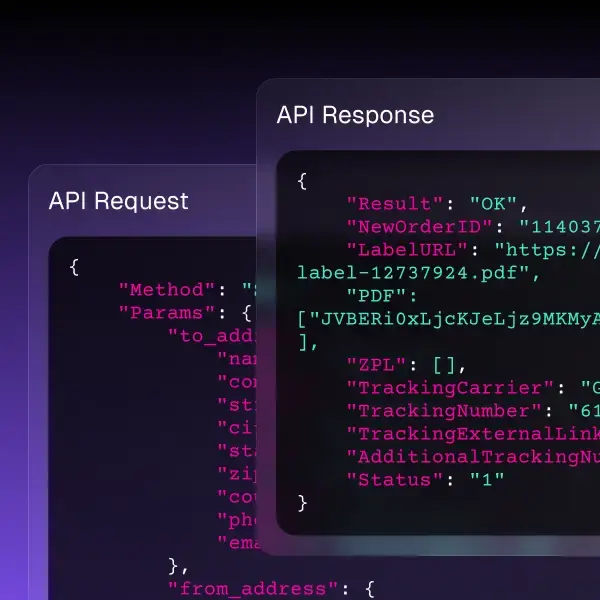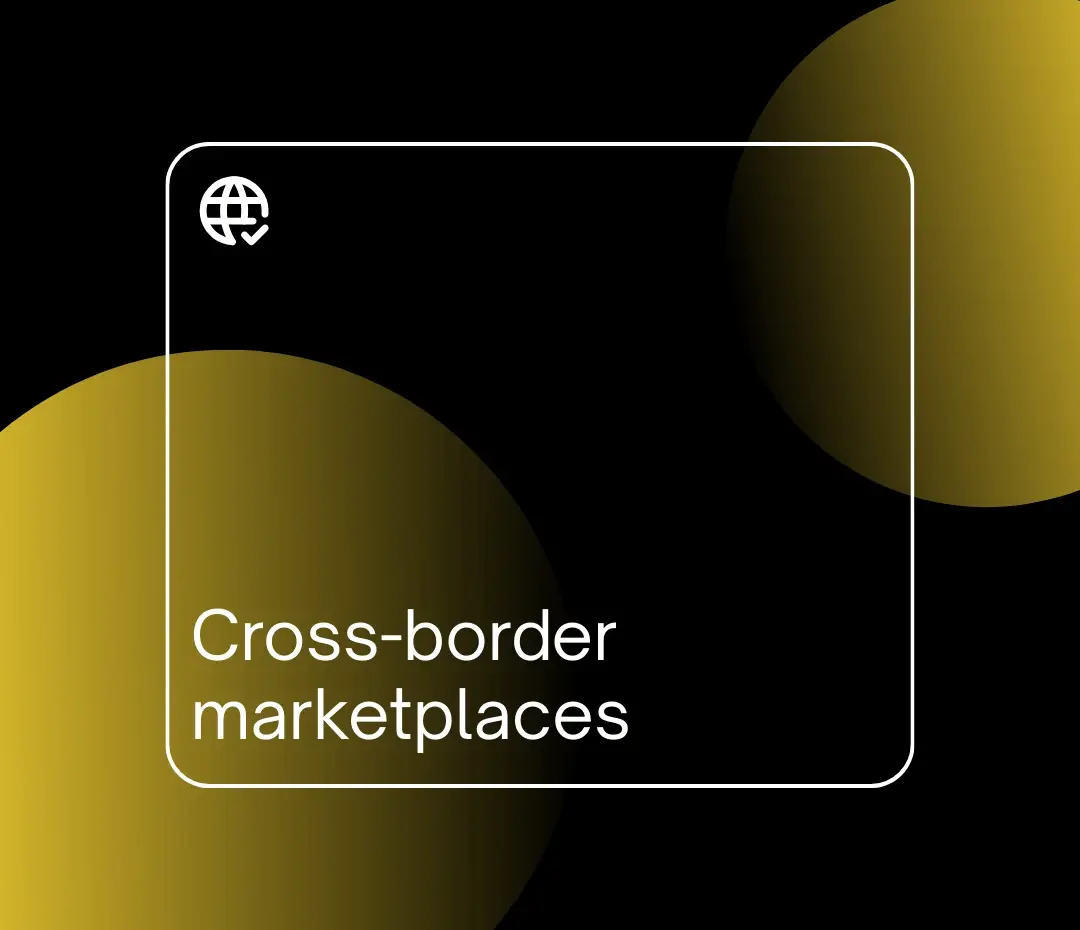Sustainable delivery: a data-driven overview in the UK market

Ecommerce is undoubtedly the most popular shopping method today and its appeal is more alive than ever, driven by the absence of hassle and instant gratification.
Predictions suggest that by 2026, nearly a quarter of all retail purchases will occur online. But this convenience comes at a cost. In fact, the rise in fast delivery options multiplies the number of vehicles on the road. This leads to increased traffic congestion, higher emissions, as well as a surge in waste production.
Fortunately, consumers are becoming more aware about the environmental impact of their shopping desires and are consequently demanding more eco-friendly delivery options - numbers speak clearly!
In this article, we’ll discover everything you need to know about sustainable delivery, providing a data-driven overview of its implications for businesses, strategies that can be adopted, and consumer expectations.
What is sustainable delivery?
Sustainable delivery or green delivery is the process of delivering orders to customers without harming the environment. This approach encompasses the whole supply chain and does not just mean minimising transport carbon emissions. In fact, its objective is to reduce the ecological footprint of all processes, from warehousing and order management to packaging, transport, and even reverse logistics.
Consumer attitudes towards sustainability by country
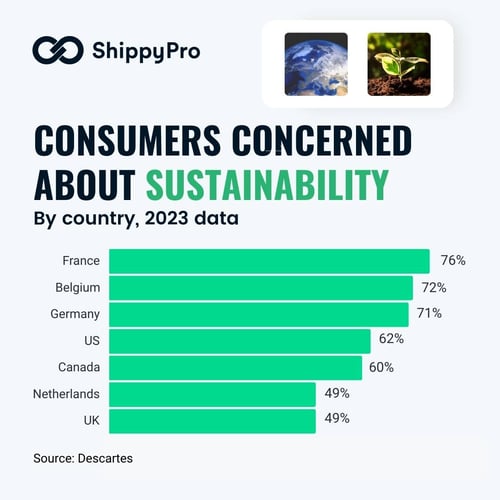 Share of consumers concerned about sustainability when purchasing online with home delivery in 2023, by country
Share of consumers concerned about sustainability when purchasing online with home delivery in 2023, by country
The demand for sustainability in the global ecommerce market is high, with many consumers in various countries shopping from businesses that adopt environmentally friendly practices.
French shoppers lead the way, with 76% prioritising eco-friendly operations. Belgium and Germany follow respectively with 72% and 71%. The United Kingdom, meanwhile, shows a consumer interest at 49%. Even though it may still seem a little low, especially if compared to other northern European countries, it indicates room for growth and the potential to tap into an emerging market of environmentally conscious customers.
Overall, statistics highlight a clear rising trend; shoppers are aligning their purchasing decisions with their environmental values, seeking out brands that not only provide good products, convenient purchasing options, and fast delivery, but also care about the planet.
Meeting this rising demand for eco-conscious consumerism implies incorporating sustainable practices throughout all ecommerce operations, from warehousing and packaging to delivery and returns. Let’s dive deep into which practises ecommerce businesses can adopt to become greener.
Sustainable delivery methods
Embarking on the path to sustainable delivery may seem overwhelming at first, given the huge change from traditional practices it implies.
Start from packaging
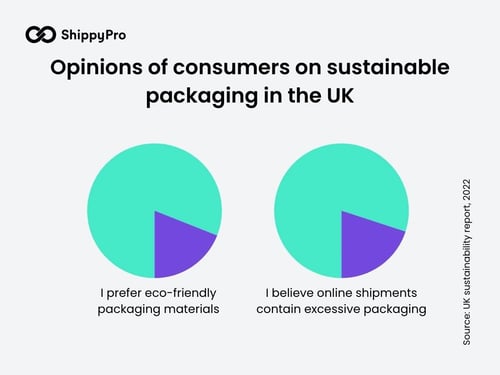 UK Consumer Attitudes Towards Packaging in E-Commerce
UK Consumer Attitudes Towards Packaging in E-Commerce
Opt for green
The rise in demand for sustainable delivery packaging in the UK is clearly mirrored in its consumer attitudes, where a staggering 81% express a preference for eco-friendly packaging materials when ordering online.
Being packaging the first tangible encounter consumers have with a brand, it becomes a huge part of the shopping experience; this shift in consumer values expresses the need for businesses to adopt greener packaging solutions.
Adopting biodegradable packaging solutions like packing peanuts that dissolve in water, compostable packets, and other eco-friendly materials can make the difference for both the planet and customers, ensuring materials don’t end up polluting oceans, lakes, rivers, or other waterways. The key in this context is to maintain creative allure, offering recognizable, custom solutions without harming the planet.
Keep it to a pretty minimum
Another interesting aspect that emerges is that 80% of customers believe that online shipments typically contain excess packaging. Retailers should therefore start evaluating and reformulating their packaging concepts. In fact, customers aren’t wrong! Most ecommerce waste derives from excess packaging, which apart from being costly, is also often unnecessary. The most important step to refine your ecommerce packaging strategy is finding the right balance between a good level of protection while selecting the most efficient packaging for the item’s size (i.e. ensuring small items are not packed in unnecessarily big boxes).
Implementing sustainable packaging solutions is not just an ethical shift but also a strategic one! In fact, it is an approach that can greatly influence consumer purchasing decisions, setting your brand apart from others.
Sustainable delivery methods: which should you implement?
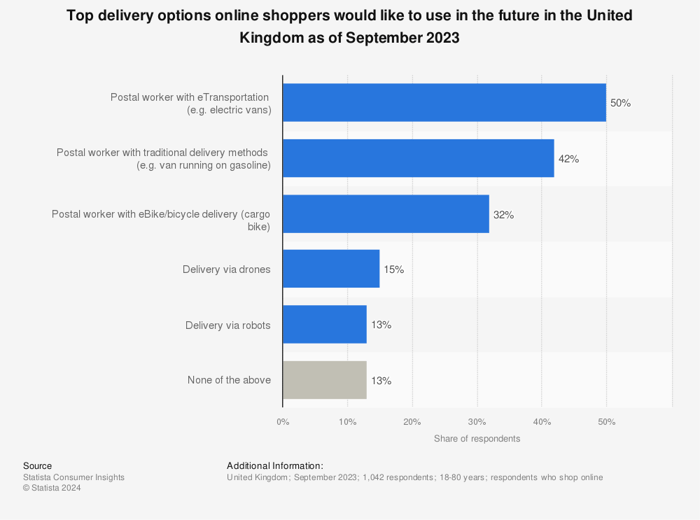 Top delivery options online shoppers would like to use in the future in the United Kingdom as of September 2023
Top delivery options online shoppers would like to use in the future in the United Kingdom as of September 2023
A recent survey conducted in the United Kingdom in September 2023 illustrates strong inclination towards environmental responsibility. Half of the online shoppers surveyed preferred postal workers driving electric zero-emission delivery vehicles.
Emerging technologies such as drones and robots are also on the radar, capturing the interest of 15% and 13% of customers. While these methods are not yet widespread, their presence in consumer consciousness indicates an anticipation of the direction delivery services can take. Finally, 13% of respondents did not prefer any of the listed delivery methods, which may suggest a gap in the market for innovative ideas.
For ecommerce businesses, these insights are extremely valuable, challenging them to broaden their horizons and explore new opportunities to meet customer expectations.
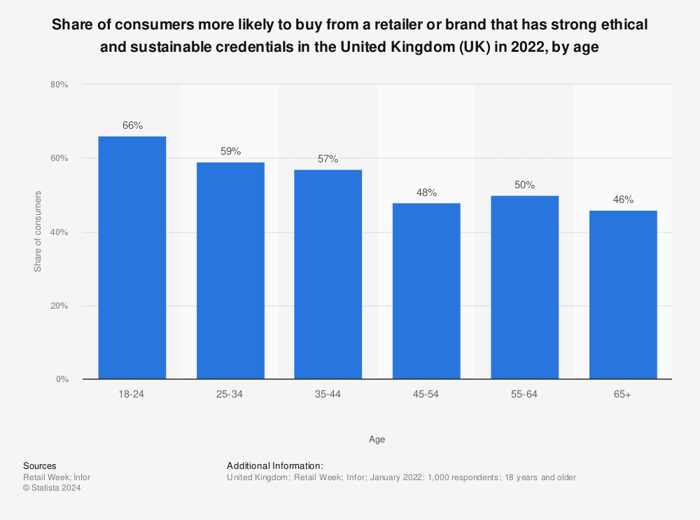
Share of consumers more likely to buy from a retailer or brand that has strong ethical and sustainable credentials in the United Kingdom (UK) in 2022, by age
Sustainable shopping appeals to different age groups within the United Kingdom, with the younger generations (aged 18-24) showing the highest preference for sustainability (66%). Same goes for the 25-34 age group at 59% and 57% of those aged 35-44. Regarding the 65+ older generations, though they seem to have the lowest percentage, at 46%, their preference is still noteworthy.
These insights suggest ecommerce owners should implement effective strategies to target their sustainability efforts across different age demographics. For example, younger generations may be more comfortable with PUDO solutions, while older ones might value home delivery made with zero-impact emission vehicles or eco-friendly packaging.
Sustainable last-mile delivery: how to reduce last mile delivery impact
Last-mile delivery, the final phase of the delivery process, is notably the most challenging. This step faces dual hurdles. On the one hand, complications rise in terms of sustainability, as it largely contributes to environmental pollution due to vehicle emissions, congestion, and fuel usage. On the other hand, the imperative for fast delivery continues to escalate. Even if customers' expectations seem contradictory, there are ways to boost last-mile delivery efficiency without impacting the planet.
Click and collect and PUDO
The rise in demand for OOH deliveries and the growing popularity of parcel lockers is a transformative trend that can be extremely beneficial for customers and businesses. By enhancing flexibility for customers and providing more affordable and efficient logistics solutions, these delivery options can mitigate challenges associated with rapid deliveries and the environment.
These hybrid delivery options allow customers to place orders online and then pick them up at a designated locker, location, or in-store.
These delivery solutions significantly lower transport environmental impact by consolidating shipments, thereby reducing the time vehicles spend on the road, eliminating the need to make single deliveries at customers’ houses.
Also, apart from being environmentally friendly, Click & Collect and PUDO services give businesses a competitive advantage by offering customers the flexibility to pick up their orders at the time and place that is most convenient for them, surpassing the need to wait at home for their orders.
Finally, these delivery solutions are also effective in reducing missed deliveries, which are also major contributors to pollution, precisely because they eliminate multiple trips to the same address.
AI route planning
Technology is the key to enhance delivery speed, reduce operational costs, and implement eco-friendly solutions. Thanks to AI route planning, carriers can easily identify the most efficient routes for every order, significantly reducing the distances they travel, thereby lowering fuel consumption and emissions.
How ShippyPro can help
Consumer preferences are shifting towards brands that incorporate green practices in their ecommerce, and shoppers are willing to support and even pay more for them. Businesses should start aligning with these needs and incorporate sustainable delivery methods at checkout to remain competitive and dedicated to fostering a harmonious relationship between human activity and the natural environment.
Transitioning to sustainable delivery solutions doesn’t have to be a hassle. ShippyPro offers an all-in-one solution to enhance fulfillment, while committing to sustainability. Here’s how:
- Eco-friendly delivery: Allow customers to choose from a network of carriers with eco-friendly delivery solutions at checkout! From delivery providers with zero-emission vehicles to PUDO and Click and Collect options, delight your customers with speed and flexibility while making the planet healthier!
- Reduce missed delivery attempts: ShippyPro allows you to improve the tracking experience for your customers thanks to the Track & Trace feature. Not only will your customers be able to track the progress of their orders in real-time, but your branded notifications will allow them to organise their timetable easily, reducing the likelihood of missed deliveries and unnecessary emissions.
- Technology: ShippyPro is a fully automated solution designed to enhance the performance of your fulfillment operations, reducing waste and streamlining processes for greater quality and efficiency. Your customers and the Planet will smile!
Conclusions
Statistics highlight a growing demand for greener ecommerce solutions. To remain competitive brands must adapt and evolve, balancing the need for speedy deliveries with sustainable practices. This can be done by implementing technology for more efficient and less wasteful operations, by offering delivery options with reduced carbon impact, and eco-friendly packaging.
Connect to ShippyPro for quality ecommerce in harmony with the Planet
Passionate freelance copywriter, with a niche in ecommerce and logistics. When collaborating with ShippyPro, she loves writing about trends, marketing and communication strategies to help brands gain an edge in an ever-evolving digital landscape.



